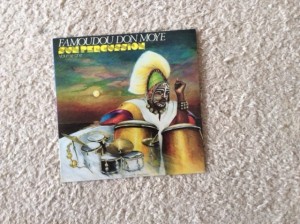„How old are you?“ asked Alfie during one of our early meetings. „Twenty-eight,“ I replied. „It’s a dangerous age,“ grinned Robert. „Don’t go near any high windows at a party.“ (Marcus O’Dair, Autor der gelungenen Robert Wyatt-Biografie) – Die Anspielung versteht jeder, der den Weg des englischen Song-Exzentrikers verfolgt hat, oder heute Abend den JazzFacts um 21.05 Uhr im Deutschlandfunk lauscht. Karl Lippegaus ist deutlich weniger angetan von dem Buch als ich, aber ich belasse es bei einem knappen Satz, um ein Gegengewicht herzustellen. Fast alles Norweger heute in der Show, und ich hatte einen Norwegerpulli angezogen, als ich auf dem Dach des Senders den Heliographen platzierte. Da wehte ein eisiger Wind, und ich erinnerte mich daran, dass ich in aller Früh Eis von der Frontscheibe meines Toyoten kratzen musste. Ein Heliograph dient bekanntlich der Bestimmung der Tagessonnenscheindauer, bis zum Mittag kam er auf eine kärgliche Stunde, ich sorgte für Abhilfe, in dem ich im Plattenladen meines Vertrauens jene Platte abholte, die ich seit Jahrzehnten vergeblich suchte und nun in der Auflösung einer Plattensammlung auftauchte: Famadou Don Moye: Sun Percussion, Volume One. Aus dem Jahre 1975. Ich bin noch etwas müde von den Schmerzarien der letzten zwölf Tage, aber in diese Erschöpfung mischt sich reine Lebensfreude. Jetzt geht es erstmal am Wochenende mit Sancho nach Sylt, ein neuerlicher Badeunfall steht nicht zu befürchten, und Sancho kriegt rohen Fisch. Wir stromern an der Küstenlinie entlang und beobachten die Drachen im Wind. Keine Abenteuer diesmal, das haben wir uns geschworen. Der alte Racker wedelt mit dem Schwanz. Gerade meldet sich der Heliograph bei meiner Computer-App. Sonnenlicht in Köln. Das Gerät prüft dann die Temperatur, die Lichtqualität und empfiehlt ein entsprechendes Sonnenlied aus seinem Spotify-Anschluss. Jetzt ist es, nicht gerade einfallsreich, einer der schönsten Songs der Welt, „Sunny Afternoon“. Ich hätte gerne mal eine Version von Robert Wyatt gehört.
2014 20 Nov.
Der Versuch, unter schwierigen Bedingungen einen Heliographen in einer Radiostation zu platzieren (3)
von: Michael Engelbrecht Filed under: Blog | TB | 3 Comments
3 Comments
-
Michael Engelbrecht:
Playlist tonight:
1) Jokleba: Bell Jar aus: Outland
2) Albatrosh: Wolf Whistle, aus Night Owl, CD 05
Marcus O’Dair, Different Every Time
The Authorised Biography of Robert Wyatt
Serpent’s Tail, London 20143) Supersilent 12.9, aus SUPERSILENT 12
4) Erik Honore: Sanctuary Revisited, aus: Heliographs
5) Sidsel Endresen & Stian Westerhus: Solemn Vista, aus: Bonita
Stuart Baker (Hg.), Black Fire! New Spirits!
Images of a revolution. Radical jazz in the USA 1960-75.
Soul Jazz Books,6) Jokleba: Tremens, aus: Outland
P.S.: Famadou Don Moye wurde bekannt als Trommler des Art Ensemble of Chicago, und diese Gruppe taucht heute abend einmal an überraschender Stelle auf.
-
Fredrik Hossmann:
So much Norwegian music – filtered through the ears of Michael – more than i have listened to in one go in a long while. Listening with closed eyes – lights off – a big cup of tea – small sips between the music. Movie-time with images projected on my inner screen. Different every time? The more it changes the more it stays the same.
-
Michael Engelbrecht:
Oregano Rathbone:
Who? Wyatt: where, when, why
If, for some entirely unfathomable reason, you didn’t already revere Robert Wyatt before reading this book, you’ll be hopelessly besotted with him by the end of it. Different Every Time doesn’t seek to flatter its subject, but nor does it need to. In the same way that Robert Wyatt’s inimitably unaffected voice embodies human frailty and honesty, his benignly empathetic persona makes everyone subconsciously perceive him as a close friend: someone who understands what it’s like to fuck up. Much as he would doubtlessly be uncomfortable with this contradiction, the more he candidly acknowledges his failings and foibles within these pages, the greater he becomes.
O’Dair’s book, dotted throughout with rarely seen photographs, cleaves to Wyatt’s own view by dividing itself into “sides one and two”, documenting Wyatt’s life before and after a dreadfully pivotal event: the fall from a fourth-floor window which resulted in his becoming paraplegic.
O’Dair unearths a welter of enthralling details when discussing Wyatt’s bohemian upbringing, his epochal “drummer biped” tenure with (and devastating disenfranchisement from) Soft Machine, his membership of the Communist Party and his inspiringly open-minded, unpremeditated solo career. Cheeringly, Alfreda (Alfie) Benge is rightly recognised for her central role as Wyatt’s invaluable collaborator and long-term companion.
